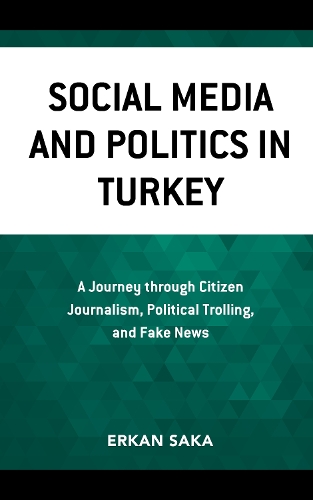
Social Media and Politics in Turkey: A Journey through Citizen Journalism, Political Trolling, and Fake News
(Paperback)
Available Formats
Publishing Details
Social Media and Politics in Turkey: A Journey through Citizen Journalism, Political Trolling, and Fake News
By (Author) Erkan Saka
Bloomsbury Publishing PLC
Lexington Books
23rd June 2021
United States
Classifications
Professional and Scholarly
Non Fiction
306.209561
Physical Properties
Paperback
140
Width 154mm, Height 218mm, Spine 11mm
218g
Description
This book focuses on media and zeroes in some critical and oppositional aspects of internet usage within Turkey. It does not radically challenge some works on Turkeys recent grand narrative but presents empirical and minor accounts to this. However, in elaborating the long history of relatively resilient and multilayered oppositional digital media networks in Turkey, this book insists that an idea of authoritarian turn may be misleading as the internet communications are exposed to repressive measures and surveillance tactics from the very beginning of the countrys recent past. While discussing from citizen journalism practices to political trolls and from Gezi Park protests to disinformation campaigns, this book pays tribute to digital activists and points out that mobilizing through digital networks can present glimmers of hope in challenging authoritarian regimes.
Reviews
This is an impressive volume that will appeal to students of Turkish politics, in large part because of the author's astute study of events leading to and arising from the 2013 Gezi Park protests. Saka (Bilgi Univ., Turkey) traces the emergence of citizen journalism through social media, having been an active participant in the dramatic and innovative use of modern technology in recent years. Before Gezi, for instance, 20,000 protesters gathered in nearby Taksim Sqaure in August 2011 to oppose efforts by the government to crack down on the Internet. This was the most significant event in Turkeys digital activism history, leading to the rise of digital citizen activism and journalism. Saka concludes that "the sphere of politics has broadened though social media/digital tools, launching a community and a political movement through platforms like Twitter, Vine, and WhatsApp, in what is still a largely autocratic and rural society. Digital tools have been used for seeking medical help, documenting police violence, debating politics, and gathering, verifying, and disseminating information. This important study will benefit both specialists and non-specialists researching Turkey or social media citizen activism in less democratic settings. Summing Up: Highly recommended. Lower-division undergraduates through faculty.
* CHOICE *A great study of Turkish media cutting across political science, media studies and journalism. Saka's analysis is revolutionary it its inclusion of all aspects relating to social media use politically in Turkey. It is fresh, insightful, well-research and surprisingly up-to-date in an area that keeps changing by the minute. The research is careful, sound, informed, concise and very much relevant to both the scholar and the everyday reader. A fresh look at Turkish media and politics that is on a solid path to be an instant classic. -- Murat Akser, Lecturer, University of Ulster
Organized around the seminal 'Occupy Gezi Park' events of 2013 and their aftermath, this meticulous account of the emergence of internet citizen journalism in Turkey by one of its pioneering figures ends with chapters on his courageous, remarkable ethnographic research on the emergence of pro-government trolls. The resulting mischief of 'fake news' appears depressingly in Turkey as elsewhere as the state has developed its own internet strategy. As an anitdote, Saka returns in his conclusion to the deeper tradition of online journalism that he chronicles to find not only hope, but inventive ideas and practices to counter the infestation of trolls. This is a meticulous, brilliantly explored work of committed ethnographic scholarship. -- George E. Marcus, University of California, Irvine
Sakas book is an outstanding examination of Internet-based communicative and political practices in Turkey, rich in excellent empirical and ethnographic material. Anyone interested in social media and politics cannot afford to miss this book. -- Elisabetta Costa, University of Groningen, author of Social Media in Southeast Turkey
Social Media and Politics in Turkey is a timely and pioneering work that offers a comprehensive and up-to-date examination of the politics of social media in Turkey. In addition to providing a historical overview of Internet adaptation and use in Turkey, Saka explores the frontiers of online activism and counter-activism, shedding much-needed light both on state censorship and on more recent phenomena such as government-sponsored political trolling and the production of fake news to undermine opposition agendas. The book will be invaluable for anyone struggling to understand Turkey in a time when politics happens as much on the streets as on the Web. -- Joakim Parslow, University of Oslo
Author Bio
Erkan Saka is associate professor of media and journalism studies at Bilgi University.
